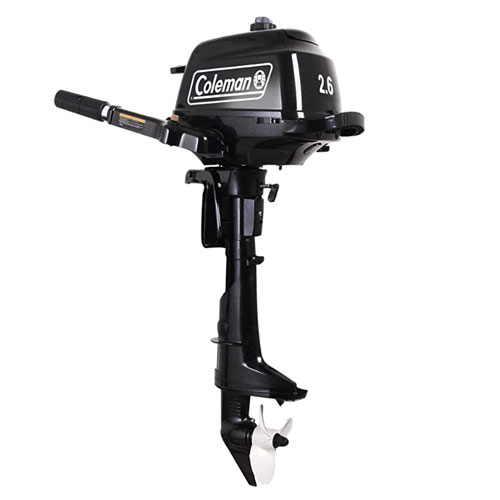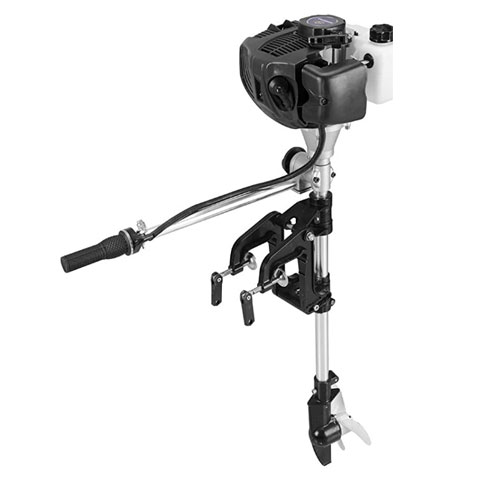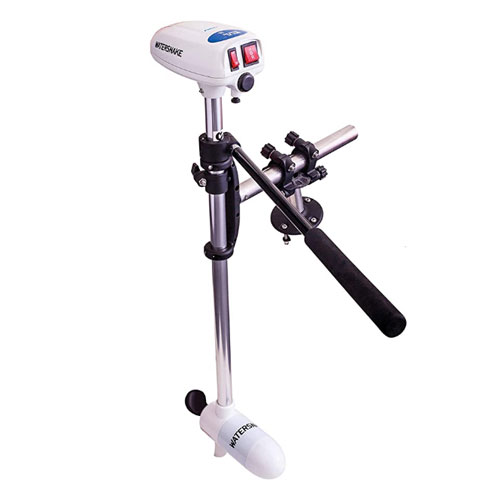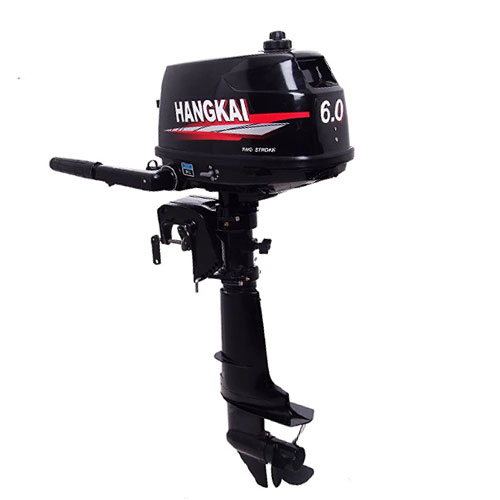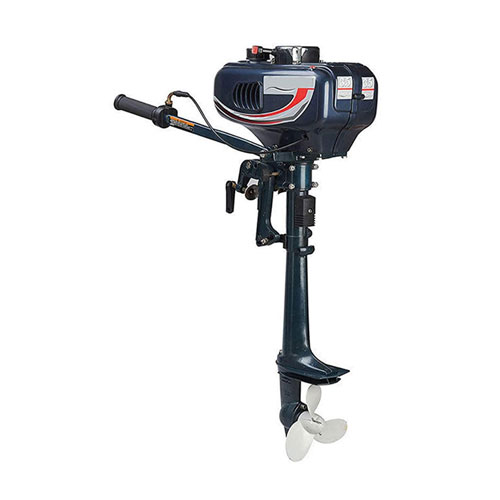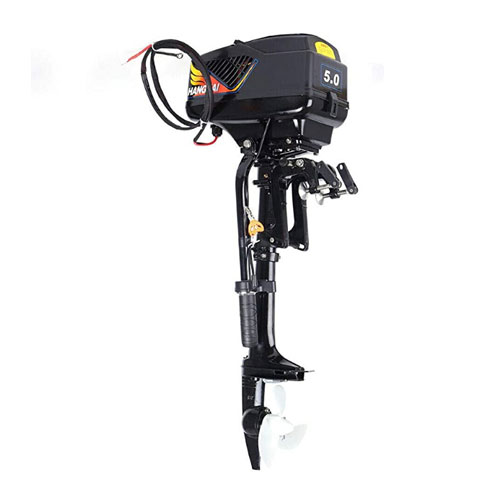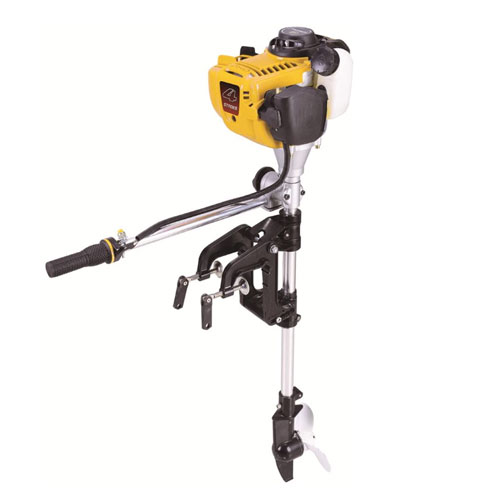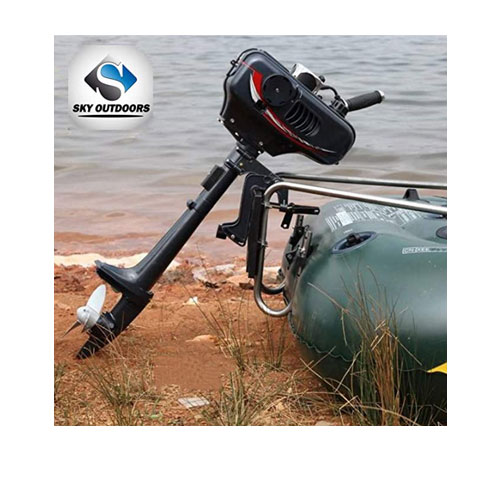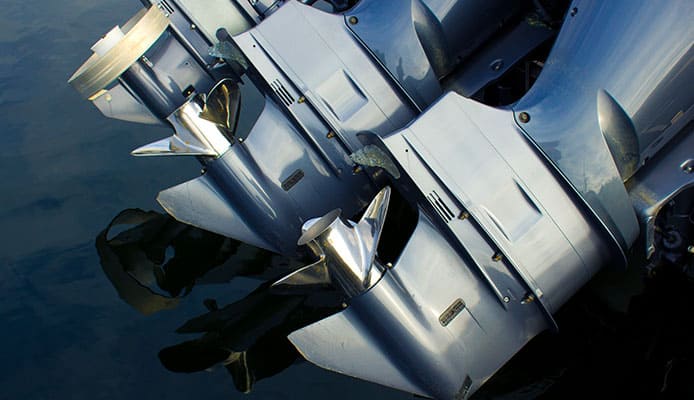
If you’re after a faster and more reliable way to move across the water, perhaps it’s time you upgraded the outboard motor on your boat. Modern small boats are hard to imagine without a good outboard motor, as they are now more efficient and affordable than ever.
With so many sizes and types available, choosing a small outboard might seem a bit complicated. But, with proper information, you’ll be able to equip your boat with just the right amount of power. In this article, you’ll learn all about the best outboard motors on the market and how you can benefit from them.
OUR TOP PICK
Coleman Powersports 2.6HP
- Stand Out Features - Why We Love It
- Incredibly lightweight considering the engine power
- TCI ignition system makes starting easy
- CE and EPA approved (eco-friendly)
- Reliable, smooth and quiet operation
Type: 4 stroke
Power Output: 2.6 horsepower
Fuel Tank: 1.2 liters
Shaft Length: 20 inches
Weight: 37.5 pounds
EDITORS CHOICE
Sea Dog Water Sports 2.5HP
- Stand Out Features - Why We Love It
- Anti-corrosive construction for saltwater use
- Air cooling system maintains engine temperature
- CDI ignition system with a recoil (manual) start
- Ideal option for inflatables and other small boats
Type: 2 stroke
Power Output: 2.5 horsepower
Fuel Tank: 1.2 liters
Weight: 21 pounds
BEST VALUE
Watersnake ASP Saltwater Transom Mount
- Stand Out Features - Why We Love It
- Electric-powered (requires a 12V marine battery)
- Efficient two-blade propeller with weedless design
- Anti-impact clip system on the shaft mount
- One of the lightest options on the market
Type: Electric
Voltage: 12V
Thrust: 18 and 24 pounds
Shaft Length: 24 inches
Weight: 4.85 pounds
Sea Dog Water Sports 6HP 2 Stroke
- Stand Out Features - Why We Love It
- User-friendly tiller control for 360° steering
- Able to go in reverse without changing gear
- Non-corrosive hardware is safe to use in saltwater
- Covered by a 1-year warranty (with free replacement parts)
Type: 2 Stroke
Power Output: 6 horsepower
Fuel Tank: 2.5 liters
Shaft Length: 26 inches
Weight: 56.9 pounds
Cozyel 3.5HP Heavy Duty
- Stand Out Features - Why We Love It
- Start-In-Gear protection prevents prop rotation when idling
- 360-degree steering allows going in reverse without changing gear
- Works best with regular unleaded gasoline in 30:1 fuel-to-oil ratio
Type: 2 Stroke
Power Output: 3.5 horsepower
Fuel Tank: 1.3 liters
Shaft Length: 16 inches
Weight: 27 pounds
- Stand Out Features - Why We Love It
- Water cooling technology improves engine performance
- Emissions from the motor meet the CE requirements
- Several different types and power outputs available
- Covered by a 3-year manufacturer’s warranty
Type: 2 Stroke
Power Output: 6 horsepower
Shaft Length: 16 inches
Weight: 55.1 pounds
Sky Superior Engine 4-stroke 1.4HP Small
- Stand Out Features - Why We Love It
- Quiet operation makes it perfect for fishing
- Comfortable and safe twist grip throttle control
- Very good fuel economy and range relative to the size
- User-friendly instructions for optimal operation
Type: 4 Stroke
Power Output: 1.4 horsepower
Fuel Tank: 650 milliliters
Shaft Length: 34.25 inches
Weight: 21.9 pounds
Sky 3.5 Hp Superior Engine
- Stand Out Features - Why We Love It
- Two-stroke motor with very good power output for its size
- Side air vents efficiently cool the motor and prevent overheating
- Lightweight body with excellent protection against corrosion
- Well-designed recoil handle makes starting the engine easy
Type: 2 Stroke
Power Output: 3.5 horsepower
Shaft Length: 26 inches
Weight: 21 pounds
How To Choose An Outboard Motor – Buying Guide
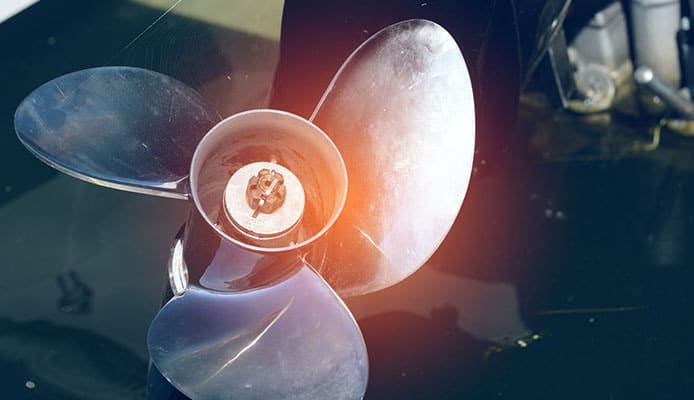
Type
As you’ve had the chance to see, the main options you have are a two-stroke and a four-stroke engine. Traditional two-stroke outboard motors are slowly being taken out of the equation, and soon enough they won’t be available in stores.
The reason for this is that they are not as energy-efficient as their alternative, and they have a larger negative effect on the marine environment. On the other hand, four-stroke outboard engines are cleaner, more reliable, and in most cases last longer.
Some manufacturers made design changes on the two-stroke, creating DFI (direct fuel injection) system. This allows the fuel mixture to be injected in precise time intervals (when the exhaust valve is closed), so all of the fuel can be burned. In turn, this increases efficiency and reduces harmful effects.
In addition to this, most small outboard motors have a manual (pull) start. Some products have an electric start as an alternative that provides more comfort. However, you would need to install a marine battery for this too, and the cost may run a bit higher.
Torque Differences
Due to their design, the 4-stroke outboard motors produce greater torque with higher efficiency. The torque curve isn’t as sharp as in two-stroke engines, which gives you a smoother experience while riding.
Even though 4-strokes are known to be heavier, this weight gap is slowly being reduced, making the difference in speed between 2 types almost non-existent.
Boat Weight
Boat weight is a factor that influences the outboard motor size. It makes sense that a larger, heavier boat requires a more powerful motor. The general rule is that you need a 5hp outboard motor per tonne. This is usually the minimum to keep you moving steadily.
If you want more speed, go with a larger motor. This also goes if you have additional people or gear aboard. On top of this, the boat propeller should be properly matched too. Keep in mind that a stronger motor weighs more, which may be a problem if you need to carry it.
Hull Capacity
When you mount the engine on the transom, your boat needs to be able to handle the weight. This (and power) is the reason manufacturers specify the largest motor you are allowed to install. This info should be pointed out in every boat manual, so be sure to look it up.
A large number of older boats were designed for lighter 2-stroke outboard engines, but 4-strokes can also be successfully installed as long as you follow the guidelines. If you overload it, you will reduce the speed and efficiency, and it can even be dangerous if the boat tips to the back too much. If the boat’s trim is too far off, water can pour in over the transom and the boat can be swamped. This is all easily avoidable by simply selecting a motor that fits your size of boat.
You might also like: Top Boat Carpets
Fuel Efficiency
Possibly the biggest downside of a 2-stroke engine is the lower efficiency. At one point during the cycle, both the intake and the exhaust port are open at the same time, allowing some of the fresh air/gasoline/oil mixes to leave the engine without being burned. This increases gas consumption, as well as hydrocarbon emissions.
On the other hand, the 4-stroke and DFI 2-stroke have the exhaust valve closed while burning the petrol, allowing them to use all the gas with increased efficiency. In addition, in a two-stroke, you need to mix fuel and oil and pour it in the tank together, while four-stroke outboards have a separate oil system for lubricating the motor.
Long Shaft or Short Shaft
Shaft length can greatly influence the ability of your outboard motor to move the boat. Shorter shafts (around 15in) are better for boats with a lower transom, inflatables for example. On the other hand, a longer shaft (20in or longer) is a better choice for many types of fishing boats.
Before getting an outboard motor, make sure to measure the transom height. Start from where the motor sits (top of the transom) vertically down until you’re in level with the hull bottom. This is the level where the cavitation plate on the shaft should be located.
If the shaft is too short, it won’t be submerged enough to work properly or it may not even reach the water. However, if it’s too long, it will add draft to the boat unnecessarily and restrict your ability to navigate in shallow waters.
FAQs
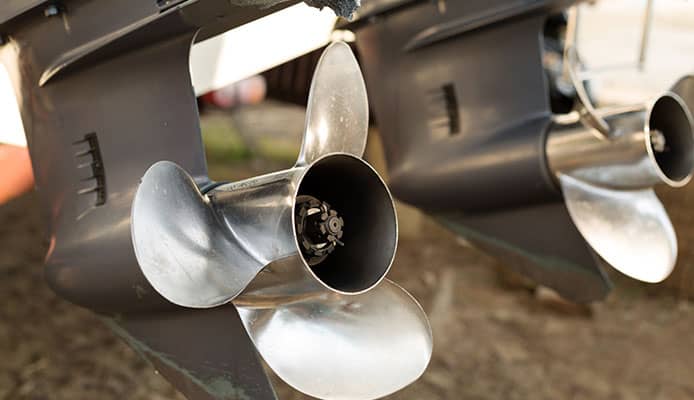
Q: Are Four Strokes Always Better Than Two Strokes?
It depends on what your needs are, but they are usually better. Despite 4 strokes being larger and heavier, they allow better speed control and have a nicer power curve. And, besides the fuel efficiency we’ve already mentioned, they are also quieter in operation.
On the other hand, a 2 stroke engine has some pluses too. It’s generally lighter (when comparing motors with the same power), and has a quicker throttle response for getting out of a risky situation fast. However, it produces more vibration, noise, and pollution.
Q: Are Two Motors Better Than One?
As we’ve mentioned, the manufacturer will specify the strongest motor you can put on your boat. If the motors combined have the same power output as a single motor, then there is no true difference between having one or two (other than price).
However, to boost safety on the water, some people like having two (with separate fuel/power sources) in case one fails and leaves them stranded, they can still safely get back to shore on the other functioning motor.
Q: Is High-Octane Gas Best?
This is not necessarily true, and you should always use the fuel mix recommended by the manufacturer. Going for higher octane fuel won’t increase efficiency, but it will increase the running cost.
Generally speaking, petrol with a high octane rating has better detonation resistance to higher compression motors. However, sometimes this won’t be necessary for your boat.
Q: Should I Rig With The Biggest Motor Allowed?
You don’t have to, but it can certainly feel great on the water. Doing this will allow you to move at a higher speed while simultaneously improving the maneuverability of your boat.
Of course, smaller motors can be satisfactory for users that aren’t very demanding, and they can be budget-friendly too. But, if your motor needs to perform, be sure not to undersize it and always take into consideration the boat size, weight, and conditions on the water.
Q: Are Outboards Maintenance-Free?
As with any engine, some maintenance is required. Doing this is important for the motor to work properly, and also helps increase its lifespan.
Every owner's manual will have detailed instructions about cleaning, flushing, checking for damage, and other tasks. Take care of your motor between seasons, clean it properly, and get a good outboard motor cover.
Q: What Speed Can You Get With Small Outboards?
This depends on the motor power as well as the boat’s weight. Most small outboards will deliver between 5 and 10mph. Larger motors rely on getting you on the plane (lifting the boat so it glides on the surface of the water, which greatly reduces drag and increases the speed.
Globo Surf Overview
A powerful outboard motor can really bring new life into your boat. The best outboard motors are available for very affordable sums nowadays, and the fact that they last a very long time makes them an even better investment.
Hopefully, you’ve found the information in the reviews and guide helpful so you can fit the best portable outboard motor on your boat and make the time on the water even more exciting.
More Boating Parts Reviews:
- Boat Seats
- Marine Radars
- Boat Fuel Stabilizers
- Boat Fuel Tanks
- Marine Toilets
- Marine Power Inverters
- Boat Steering Wheels
- Marine Battery Boxes
- Marine Battery Chargers



